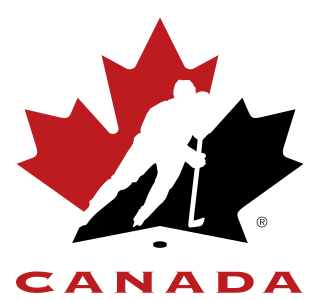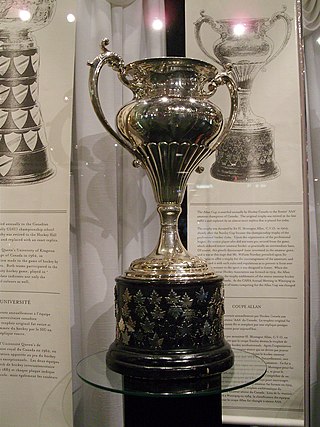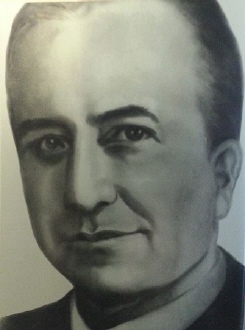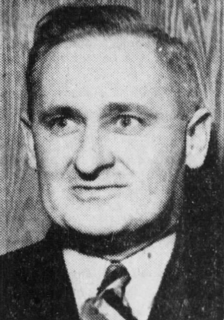
Hockey Canada is the national governing body of ice hockey and ice sledge hockey in Canada. It is a member of the International Ice Hockey Federation and controls the majority of organized ice hockey in Canada. There are some notable exceptions, such as the Canadian Hockey League, U Sports, and Canada's professional hockey clubs; the former two are partnered with Hockey Canada but are not member organizations. Hockey Canada is based in Calgary, with a secondary office in Ottawa and regional centres in Toronto, Winnipeg and Montreal.
The men's ice hockey tournament at the 1948 Winter Olympics in St. Moritz, Switzerland, was the sixth Olympic Championship, also served as the 15th World Championships and the 26th European Championships. Canada won its fifth Olympic gold medal and 12th World Championship, represented by the Ottawa RCAF Flyers team of Canadian Armed Forces personnel. The highest-finishing European team Czechoslovakia, won the silver medal and its eighth European Championship. Bibi Torriani played for Switzerland which won the bronze medal, and became the first ice hockey player to recite the Olympic Oath on behalf of all athletes.

François Xavier Boucher was a Canadian professional ice hockey player and executive. Boucher played the forward position for the Ottawa Senators and New York Rangers in the National Hockey League (NHL) and the Vancouver Maroons in the Pacific Coast Hockey Association (PCHA) between 1921 and 1938, and again from 1943 to 1944. Boucher later became coach and the general manager of the New York Rangers between 1939 and 1955. He won the Stanley Cup three times, all with the Rangers: in 1928 and 1933 as a player, and in 1940 as the coach. Boucher was inducted into the Hockey Hall of Fame in 1958. Three of his brothers also played in the NHL, including Georges, who was also inducted into the Hockey Hall of Fame.

John Georges "Buck" Boucher was a Canadian professional ice hockey defenceman who played for the Ottawa Senators, Montreal Maroons, and Chicago Black Hawks in the National Hockey Association and National Hockey League between 1915 and 1932. Born in Ottawa, Ontario, Buck was one of six brothers. His brothers Frank, Bobby and Billy all played in the NHL. Their father Tom Boucher, played rugby football, winning the Canadian championship in 1894, 1896, 1897 and 1901. Boucher started his professional athletic career in football as halfback for the Ottawa Rough Riders of the Canadian Football League. After three years of football he switched to hockey.

Hockey Québec is the governing body of all ice hockey in Quebec, Canada. Hockey Québec is a branch of Hockey Canada.
The Quebec Senior Hockey League (QSHL) was an ice hockey league that operated from 1941 to 1959, based in Quebec, Canada. The league played senior ice hockey under the jurisdiction of the Quebec Amateur Hockey Association until 1953, when it became professional and operated as the Quebec Hockey League (QHL).

George Samuel Dudley was a Canadian ice hockey administrator. He joined the Ontario Hockey Association (OHA) executive in 1928, served as its president from 1934 to 1936, and as its treasurer from 1936 to 1960. He was elected to Canadian Amateur Hockey Association (CAHA) executive in 1936, served as its president from 1940 to 1942, as its secretary from 1945 to 1947, and as its secretary-manager from 1947 to 1960. He was secretary of the International Ice Hockey Association from 1945 to 1947, and was later vice-president of the International Ice Hockey Federation (IIHF) from 1957 to 1960. He was expected to become the next president of the IIHF before his death. He graduated from Osgoode Hall Law School in 1917 then practiced law for 43 years as the town solicitor for Midland, Ontario.

Allan Wilfrid Pickard was a Canadian ice hockey administrator, who served as president of the Canadian Amateur Hockey Association (CAHA) from 1947 to 1950. When Canada opted out of the 1947 Ice Hockey World Championships and decided not to participate in the 1948 Winter Olympics, Pickard felt that Canada was obliged to send a team due to its place as a top hockey nation, and nominated the Ottawa RCAF Flyers who won the gold medal for Canada and lived up to the requirements of the Olympic Oath as amateurs. Despite disagreement with the International Olympic Committee, he sought for the International Ice Hockey Federation to adopt the CAHA definition of amateur in the face of increasing difficulty in selecting the Canada men's national ice hockey team.
Murray Albert Dowey, was a Canadian ice hockey goaltender. Nicknamed "Fast Hands", he was a member of the Ottawa RCAF Flyers, which won the gold medal in ice hockey representing Canada at the 1948 Winter Olympics in St. Moritz.

Henri-André Laperrière was a Canadian ice hockey defenceman. He was a member of the Ottawa RCAF Flyers team that won the gold medal in ice hockey at the 1948 Winter Olympics. As a member of the RCAF Flyers, Laperrière was inducted into the Canadian Forces Sports Hall of Fame in 1971, and into the Canadian Olympic Hall of Fame in 2008.

Albert Roméo "Ab" Renaud, sometimes referred to as Albert Ranaud, was a Canadian ice hockey player. He was a member of the Ottawa RCAF Flyers who won the gold medal in ice hockey for Canada at the 1948 Winter Olympics in St. Moritz.
Ross Hartford King was a Canadian ice hockey goaltender. He was a member of the Ottawa RCAF Flyers who won the gold medal in ice hockey for Canada at the 1948 Winter Olympics in St. Moritz.
Andrew Crowley Gilpin was a Canadian ice hockey forward. Born in Montreal, Quebec, he was a member of the Ottawa RCAF Flyers who won the gold medal in ice hockey for Canada at the 1948 Winter Olympics in St. Moritz. Gilpin played Junior A hockey in Montreal. He joined the Royal Canadian Air Force (RCAF), and in March 1947 he was transferred to the RCAF station in the "hockey crazy" town of Whitehorse, Yukon.

Hubert Brooks MC was a Canadian RCAF officer and ice hockey player who won a gold medal at the 1948 Winter Olympics in St. Moritz. He joined the RCAF in 1940 and served during World War II, being shot down during his second mission over Germany in 1942. He was taken as a prisoner of war to Stalag VIII-B, from where he tried several unsuccessful escape attempts prior to making it to occupied Poland and joining the Polish Underground State as a guerrilla. He rose through the ranks of the rebel force, undertaking raids and assassinations against the Nazi occupation until the end of the conflict. He was one of only five RCAF members to receive the Military Cross for his actions and his award carried the longest citation of them all.
Roy Austin Forbes was a Canadian ice hockey player. He was a member of the Ottawa RCAF Flyers who won the gold medal in ice hockey for Canada at the 1948 Winter Olympics in St. Moritz.

Sgt. Frank Boucher was a Canadian ice hockey coach and Royal Canadian Air Force (RCAF) non-commissioned officer. He served as the head coach of the Ottawa RCAF Flyers which represented the Canadian national hockey team in ice hockey at the 1948 Winter Olympics. Despite two lopsided losses in exhibition games before the Olympics, Canadian Amateur Hockey Association vice-president Norman Dawe held an emergency meeting and retained Boucher as coach, and agreed to bolster the team from the best available players. The Flyers went on the win the gold medal for Canada. The 1948 team was honoured by the Canadian Forces in 2001, when selected as Canada's greatest military athletes of the 20th century.

The 1942 Allan Cup was the senior ice hockey championship of the Canadian Amateur Hockey Association for the 1941–42 season. The Ottawa RCAF Flyers defeated the Port Arthur Bearcats by three games to two to win the Allan Cup.

Cecil Charles Duncan was a Canadian ice hockey administrator. He served as president of the Canadian Amateur Hockey Association (CAHA) from 1936 to 1938 and led reforms towards semi-professionalism in ice hockey in Canada. He served as chairman of the CAHA committee which proposed a new definition of amateur to eliminate what it called "shamateurism", in the wake of Canada's struggles in ice hockey at the 1936 Winter Olympics. He negotiated a series of agreements to protect the CAHA's interests, and to develop relationships with all other areas of the world where hockey was played. The agreements allowed the CAHA to become independent of the Amateur Athletic Union of Canada which wanted to keep the old definition of pure amateurism. Duncan's reforms also returned the CAHA to affluence after four years of deficits during the Great Depression and increased player registrations in Canada.

Lionel Fleury was a Canadian ice hockey administrator who served as president of the Canadian Amateur Hockey Association from 1964 to 1966. Under his leadership, the Canada men's national ice hockey team transitioned from student athletes coached by Father David Bauer into a year-round national team program. Fleury welcomed the Newfoundland Amateur Hockey Association as a new branch member of the national association in 1966, and changed the format of the Memorial Cup playoffs in Eastern Canada from an elimination bracket into a round-robin format to reduce travel costs and address concerns of imbalanced competition. He sought an end to the National Hockey League system of sponsoring amateur teams by replacing it with a draft of players who had graduated from junior ice hockey, and negotiated for a new agreement that was realized after his term as president concluded.

Robert Norman Dawe was a Canadian sports executive. He originated as an ice hockey referee for minor ice hockey games in Verdun, Quebec, before becoming involved in the administrative aspect of sports. He was a member of the local YMCA executive, served as secretary of the Verdun Playgrounds Commission from 1923 to 1948, and organized the Verdun Hockey Board. He served as a member of the Quebec Amateur Hockey Association (QAHA) executive committee for 23 seasons, and helped establish a provincial referee's board in 1936. In Montreal and Verdun, he was involved in girls' fastpitch softball. He served as the Montreal Ladies' Major Softball League president from 1940 to 1945, then was president of the Verdun Ladies' Softball League from 1945 to 1947. He began organizing Canadian football in 1945, when he established the Verdun Juvenile Football League and served as president.
















